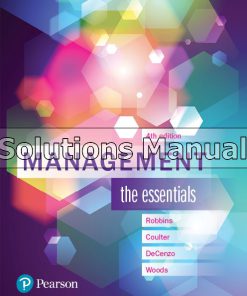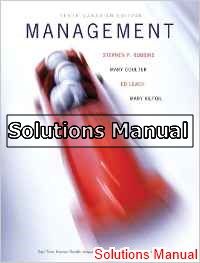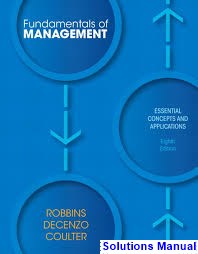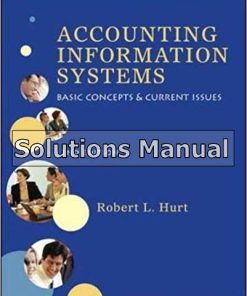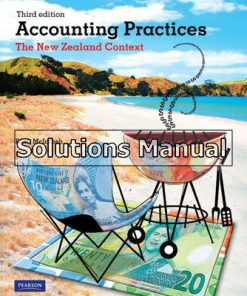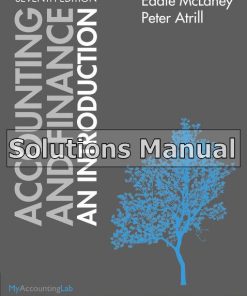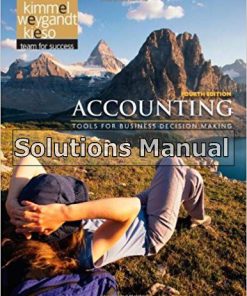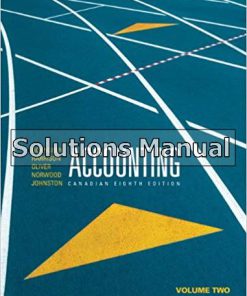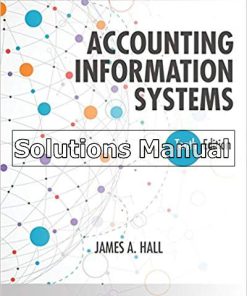Management 7th Edition Robbins Solutions Manual
You may also like
-
$26.50
$50.00 -
$26.50
$50.00
Management 7th Edition Robbins Solutions Manual
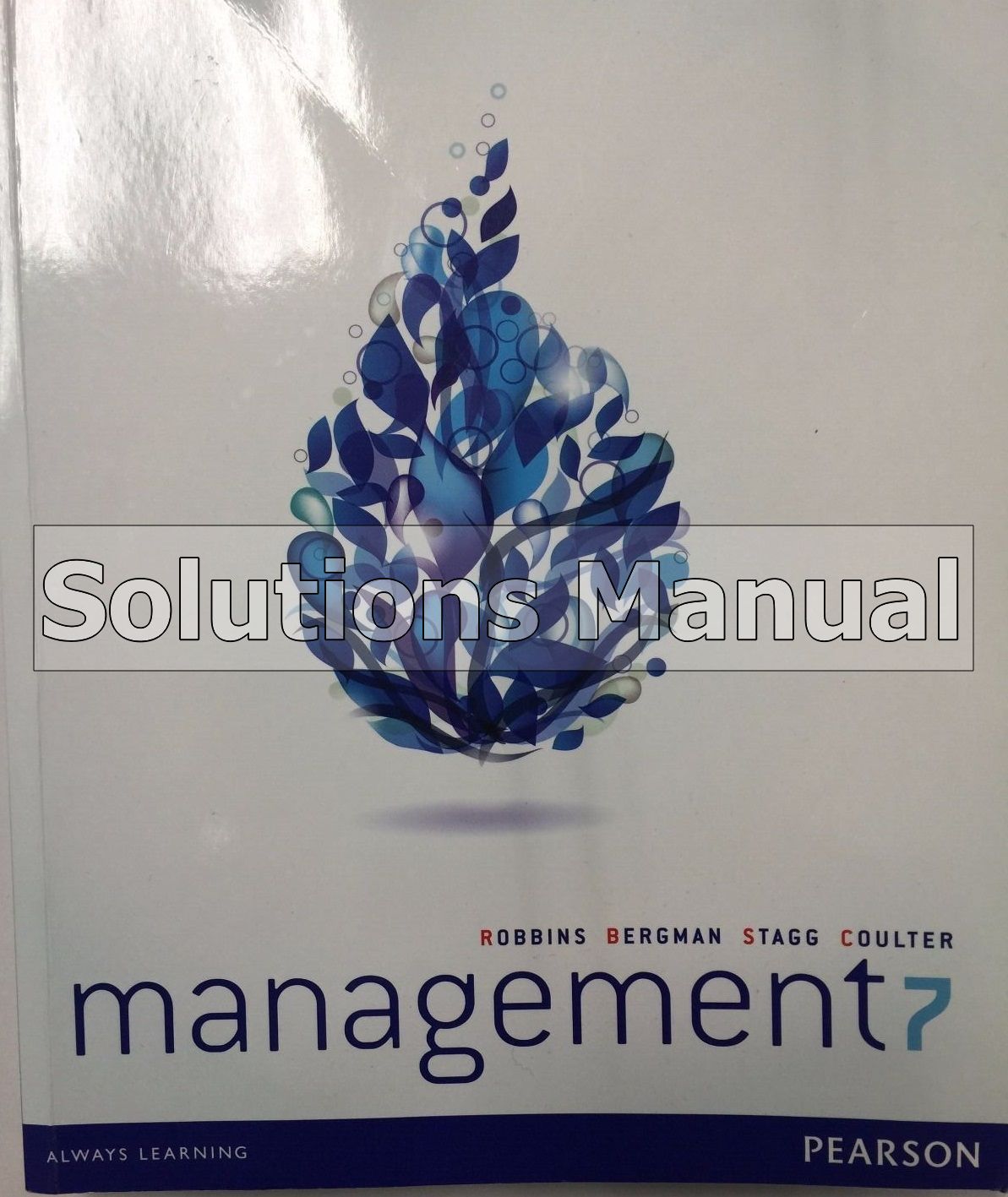
Product details:
- ISBN-10 : 9780130319654
- ISBN-13 : 978-0130319654
- Author:
6E-7, Robbins, Stephen P., Coulter, Mary, Management, 7/E* Robbins and Coulter’s best-selling book demonstrates the real-world applications of management concepts and makes management come alive by bringing real managers and readers together. As it successfully integrates the various functions of management, the book establishes a dialogue with managers from a variety of fields Chapter-opening ?A Managers Dilemma? vignettes introduce readers to real situations? faced by real managers, and chapter-ending ?Real Managers Respond to Opening Dilemma? discussions explore successful resolutions?both using the concepts covered in each chapter. These chapters cover an introduction to management and organizations, management yesterday and today, organizational culture and environment, managing in a global environment, social responsibility and managerial ethics, managing entrepreneurial ventures, decision-making, managing change and innovation, understanding groups and teams, and much more. For all level managers in a variety of fields.
Table contents:
Chapter 1 The contemporary workplace 1
Introduction 2
1.1 Working in today’s economy 3
1.2 Organisations in today’s workplace 9
1.3 Managers in today’s workplace 12
1.4 The management process 23
1.5 Managerial learning 25
Summary 30
Key terms 31
Applied activities 32
Endnotes 32
Acknowledgements 34
Chapter 2 Historical foundations of management 35
Introduction 37
2.1 Classical approaches to management 37
2.2 Behavioural approaches to management 42
2.3 Quantitative approaches to management 45
2.4 Modern approaches to management 46
2.5 Continuing management themes 48
Summary 54
Key terms 54
Applied activities 55
Endnotes 55
Acknowledgements 57
Chapter 3 Environment and diversity 58
Introduction 60
3.1 Environment and competitive advantage 60
3.2 Internal environment and organisational culture 65
3.3 Customer-driven organisations 68
3.4 Quality-driven organisations 70
3.5 Diversity and multicultural organisations 72
Summary 80
Key terms 81
Applied activities 81
Endnotes 82
Acknowledgements 85
Chapter 4 International dimensions of management 86
Introduction 87
4.1 International management and globalisation 88
4.2 International business challenges 94
4.3 Multinational corporations 98
4.4 Culture and global diversity 100
4.5 Management across cultures 105
Summary 110
Key terms 110
Applied activities 111
Endnotes 112
Acknowledgements 114
Chapter 5 Ethical behaviour and social responsibility 115
Introduction 116
5.1 What is ethical behaviour? 117
5.2 Ethics in the workplace 121
5.3 Maintaining high ethical standards 124
5.4 Social responsibility 126
5.5 Organisations and society 131
Summary 133
Key terms 133
Applied activities 134
Endnotes 134
Acknowledgements 137
Chapter 6 Sustainability 138
Introduction 139
6.1 What is sustainability? 140
6.2 International sustainability guidelines for business 144
6.3 Sustainability and organisations 148
6.4 Organisational change: developing the sustainable firm 151
6.5 Current trends in business sustainability 152
Summary 155
Key terms 155
Applied activities 156
Endnotes 156
Acknowledgements 158
Chapter 7 Information and decision making 159
Introduction 161
7.1 Information technology and the new workplace 162
7.2 Information and information systems 165
7.3 Information and decision making 171
7.4 The decision-making process 173
7.5 Knowledge management and organisational learning 178
Summary 180
Key terms 180
Applied activities 181
Endnotes 182
Acknowledgements 183
Chapter 8 Planning 184
Introduction 186
8.1 How and why managers plan 187
8.2 Types of plans used by managers 191
8.3 Planning tools, techniques and processes 194
Summary 202
Key terms 202
Applied activities 203
Endnotes 203
Acknowledgements 204
Chapter 9 Strategic management 205
Introduction 206
9.1 Sustainable strategic competitiveness 207
9.2 The strategic management process 210
9.3 Strategies used by organisations 216
9.4 Strategy formulation 220
9.5 Strategy implementation 226
Summary 229
Key terms 230
Applied activities 230
Endnotes 231
Acknowledgements 233
Chapter 10 Organising 234
Introduction 236
10.1 Organising as a management function 236
10.2 Traditional organisation structures 238
10.3 Essentials of organisational design 243
10.4 Contingencies in organisational Environment 247
10.5 Developments in organisation Team structures 251
10.6 Subsystems design and integration 254
10.7 Organising trends 257
Summary 260
Key terms 261
Applied activities 262
Endnotes 262
Acknowledgements 264
Chapter 11 Controlling 265
Introduction 266
11.1 Organisational control 267
11.2 Types of controls 270
11.3 Organisational control systems 273
Summary 282
Key terms 282
Applied activities 283
Endnotes 283
Acknowledgements 284
Chapter 12 Human resource management 285
Introduction 287
12.1 Diversity and the importance of people 288
12.2 HRM 291
12.3 Attracting a quality workforce 298
12.4 Developing a quality workforce 303
12.5 Engagement: maintaining a quality workforce 307
Summary 316
Key terms 316
Applied activities 317
Endnotes 318
Acknowledgements 320
Chapter 13 Leading 321
Introduction 322
13.1 The nature of leadership 323
13.2 Leadership traits and behaviours 326
13.3 Contingency approaches to Fiedler’s contingency model 329
13.4 Issues in leadership development 334
Summary 340
Key terms 340
Applied activities 341
Endnotes 341
Acknowledgements 344
Chapter 14 Communication and interpersonal skills 345
Introduction 346
14.1 The communication process 347
14.2 Improving communication 351
14.3 Perception 358
14.4 Communication and conflict management 360
14.5 Negotiation 364
Summary 368
Key terms 369
Applied activities 370
Endnotes 370
Acknowledgements 372
Chapter 15 Motivation and rewards 373
Introduction 374
15.1 What is motivation? 375
15.2 Content theories of motivation 377
15.3 Process theories of motivation 382
15.4 Reinforcement theory of motivation 387
15.5 Motivation and remuneration 390
Summary 395
Key terms 396
Applied activities 396
Endnotes 396
Acknowledgements 399
Chapter 16 Individuals, job design and stress 400
Introduction 401
16.1 The meaning of work 402
16.2 Satisfaction, performance and job design 404
16.3 Directions in job enrichment 411
16.4 Alternative work arrangements 414
16.5 Job stress 418
Summary 424
Key terms 425
Applied activities 425
Endnotes 426
Acknowledgements 428
Chapter 17 Teams and teamwork 429
Introduction 430
17.1 Teams in organisations 431
17.2 Trends in the use of teams 433
17.4 Decision making in teams 446
17.5 Leading high-performance teams 448
Summary 451
Key terms 452
Applied activities 452
Endnotes 452
Acknowledgements 454
Chapter 18 Leading and managing change 455
Introduction 457
18.1 Challenges of change 458
18.2 Organisational change 464
18.3 Managing planned change 468
18.4 Organisation development 477
18.5 Personal change and career readiness 483
Summary 486
Key terms 487
Applied activities 488
Endnotes 488
Acknowledgements 490
Chapter 19 Entrepreneurship and new ventures 491
Introduction 493
19.1 The nature of entrepreneurship 493
19.2 Entrepreneurship and small business 499
19.3 New venture creation 503
19.4 Entrepreneurship and business
Summary 508
Key terms 508
Applied activities 509
Endnotes 509
Acknowledgements 511
Chapter 20 Operations and services management 512
Introduction 514
20.1 Operations management essentials 514
20.2 Value chain management 517
20.3 Service and product quality 521
20.4 Work processes 525
20.5 Physical factors in the workplace 527
Summary 529
Key terms 529
Applied activities 530
Endnotes 530
Acknowledgements 531
People also search:
Management 7th
Management 7th edition
Management 7th pdf
Management 7th pdf free
Management 7th download scribd


